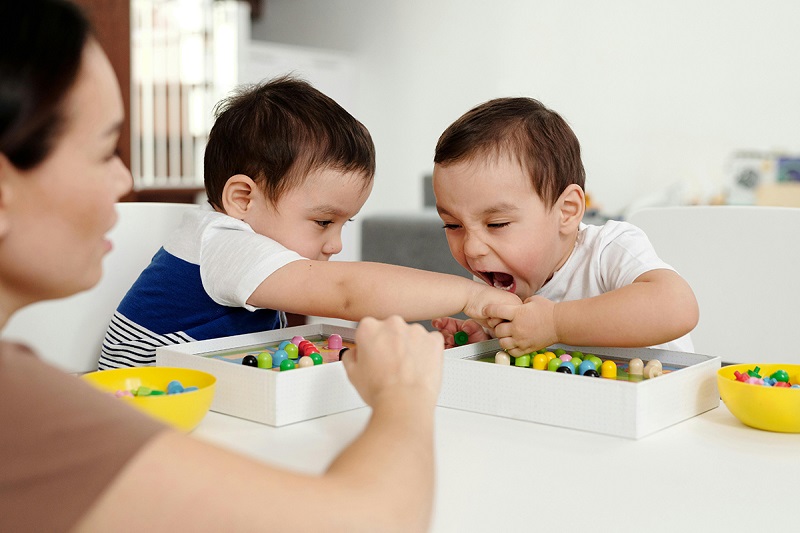Let’s just say it: when your kid hits another kid, it sucks. And when your kid is hit by another kid, that also sucks. Whether it’s a sibling, a friend, or some random kid at the playground, it’s easy to be angry and upset, regardless of the side your child is on.
Biting is similar, possibly engendering even more extreme feelings. I don’t know that I’ve ever seen my parents more upset than the time my brother bit my arm, breaking the skin (also, it was annoying because I had to get a tetanus shot).
A very common reaction to this is a version of Why is my kid doing this? Is this normal? Are they a bad kid? Is hitting their sibling today just the first step to jail?
For better or worse, I think these feelings are more extreme now than they were when we were kids because our overall tolerance for violence among kids has changed. When I was in school, kids sometimes fought with each other — literal, physical fights. I am not proud of this, but in eighth grade, I slapped another student (sorry, Chris) across the face. Nothing happened! No one even mentioned it! I cannot imagine the number of meetings I would be in if my eighth-grade daughter did this. Not to mention that I would be completely horrified and wonder what on earth was wrong with her.
It’s probably good that we have dialed down physical altercations among middle school students, but for younger kids, despite the change in attitudes, hitting and biting remain both common and developmentally appropriate. This is what your pediatrician is likely to tell you if you ask about it, but that can feel empty without data. Today’s post is just some basic data, from the published literature and from some of you, about the frequency of hitting and biting among children.

How common is hitting among kids?
Hitting is such a common behavior that there isn’t much systematic data. This paper — from 1985! — is an example of the kind of work that is done on it. It’s a paper that aims to describe the details of aggressive behaviors (grabbing, hitting, shoving) among children. Over the course of the researchers’ several playgroup observation sessions, the number of these events among the children ranged from 1 to 63 times; every kid showed aggressive behavior at some point. But since that’s expected, that’s not the focus of the paper.
There is a small amount of more recent data. This survey of 357 children living in poverty found that 50% to 60% of children were coded as hitting others.
I got curious about what a larger — albeit decidedly non-random — sample of you would say when asked about this. So, in 2024, we surveyed the ParentData audience, and 4,733 of you replied to questions about your child’s hitting behavior.
First point: Among people with children 4 or older, 75% of them said their child had, at some point, hit another child. The graph below shows the share of parents who say their child has hit another child within the past six months.
We can see that among kids in the toddler and elementary school age range; this number is a bit over 50% (notably, very similar to the figures in that smaller published paper). Hitting is much rarer in children under a year or over 11 years. When kids hit, they hit a lot. Among those who have hit someone in the past six months, 33% are doing so at least weekly.
We also asked people if their child had been hit by another child. Again, among those with kids over 4, 83% of them said their child had been hit by another child.
In short: Hitting is extremely common. I didn’t differentiate between siblings here, but it goes without saying that kids who have siblings tend to hit them first (this came out in a lot of comments as well).
How common is biting in kids?
There is slightly better data on biting than on hitting since childcare centers report it. However, most of our data on it is fairly old. Not that toddlers have changed too much!
A paper from the early 1990s sets the stage by reviewing the data up to that point. Studies from childcare centers found that about half of the children had been bitten at some point. The data suggested that most of the children who were bitten received multiple bites over the course of the study period. Toddlers tend to bite more than older children, and, as this article notes, it’s difficult to prevent bites. As the authors say, “Children who bite strike with lightning speed…”
There actually isn’t much beyond this, and what’s not entirely clear here is what share of children do the biting. We know that boys are more likely to bite than girls (and more likely to be bitten), but when we say that half of kids have been bitten, that doesn’t tell us if it is a small number of biters.
In the ParentData audience survey, we also asked about biting. Among those with children over 4, 38% said their child had bitten another child at least once. Here’s the graph of biting in the past six months by age.
Interestingly, biting behavior seems to start a bit earlier and really peaks in these toddler years. School-age kids are relatively less likely to bite.
When kids do bite, it is less common than hitting. Only about 14% of kids are doing it weekly, and a larger number are one-time biters. Still, overall, about 65% of parents of kids over the age of 4 report that their child has been bitten.
In your words
Many of you shared personal experiences with hitting and biting at the end of the survey. For some, it is an ongoing source of stress:
“He grew out of the biting earlier than I maybe expected. But the hitting! He hits with any emotion. Happy? Hit! Excited? Hit! Frustrated? Hit, kick, scream! At 4, we’re starting to make progress.”
“The shame/guilt is real when your child is the biter! When it happens while they’re at daycare, you feel powerless because they can’t remember it and talk to you about it after you pick them up (I’m referencing a 1- to 2-year-old). Obviously, it’s also bad when your child gets bitten — not downplaying that at all, either. But parents can feel powerless either way, I guess.”
Some of you have found strategies to address the behaviors on your own:
“Providing an alternative behavior helps a lot! Even just a phrase to use: ‘I need some space.’ ”
“My son hits when he is overly excited or when he’s so frustrated he can’t figure out what else to do. We try to redirect when he’s excited, and when he’s frustrated, we try to validate but stop his hands with a ‘You can be mad, but you can’t hit’ while holding his arms.”
And others have found that additional support has made a big difference:
“Hitting and — more often — pushing have been issues for my son since preschool. We have tried talking about it, reading about it, teaching and practicing calm-down strategies, having positive/negative consequences, etc. But in the moment, when angry, especially if he felt teased, he would still resort to pushing. It wasn’t until second grade that he was diagnosed with ADHD that it started to make sense. Medication and learning about ADHD have finally helped. I don’t want to pretend that it doesn’t matter. I have always told him that there is never any reason to touch another child. But there is so much judgment and stigma that goes along with it.”
“Our child has been a ‘biter’ since age 2.5 when other kids at school started biting. He is sensory-seeking and is constantly putting things in his mouth/very orally fixated. We are currently in OT and speech therapy to work on biting and communicating better with words. I wish it was as simple as saying, ‘We don’t bite’ or reading him a book or whatever else has been recommended on parenting sites, but with our son, it has required a lot more time/money/attention/repetition. Once I read about sensory processing disorders and sensory-seeking children, a lot of his behaviors clicked for me, and we have been working in a better direction ever since.”
Closing thoughts
This isn’t an article about how to respond to biting or hitting. It’s just to put data behind what you’re almost certainly hearing from your pediatrician if you ask about it: these are normal behaviors. Does that mean we should encourage them? Of course not! But you also shouldn’t worry that there is something wrong with your kid if they do them.
The bottom line
- Hitting is extremely common among young children, especially toddlers and early elementary-aged kids.
- Biting also occurs frequently but tends to peak earlier, typically in the toddler years.
- These behaviors, while upsetting, are developmentally normal, especially in younger children. Pediatricians generally view hitting and biting as expected.
- Parents’ experiences vary widely, with some finding success through redirection or professional support like occupational therapy. Others express stress, guilt, and difficulty in managing these behaviors, especially when external factors like ADHD or sensory issues are involved.




















Log in
I feel like the standards we hold young kids (especially boys) to around respecting boundaries are too high when we consider data like this. I have my 3yo and 5yo in mind as I write this. I understand that we are trying to undo norms that we believe helped lead to high rates of sexual abuse/violence, but we also have to balance that with expectations that are developmentally appropriate. I’d also love to see an article about whether or not there is evidence that all the talk of boundaries for young kids actually leads to different outcomes in adulthood. Of course, not sure how you would even make that causal link.